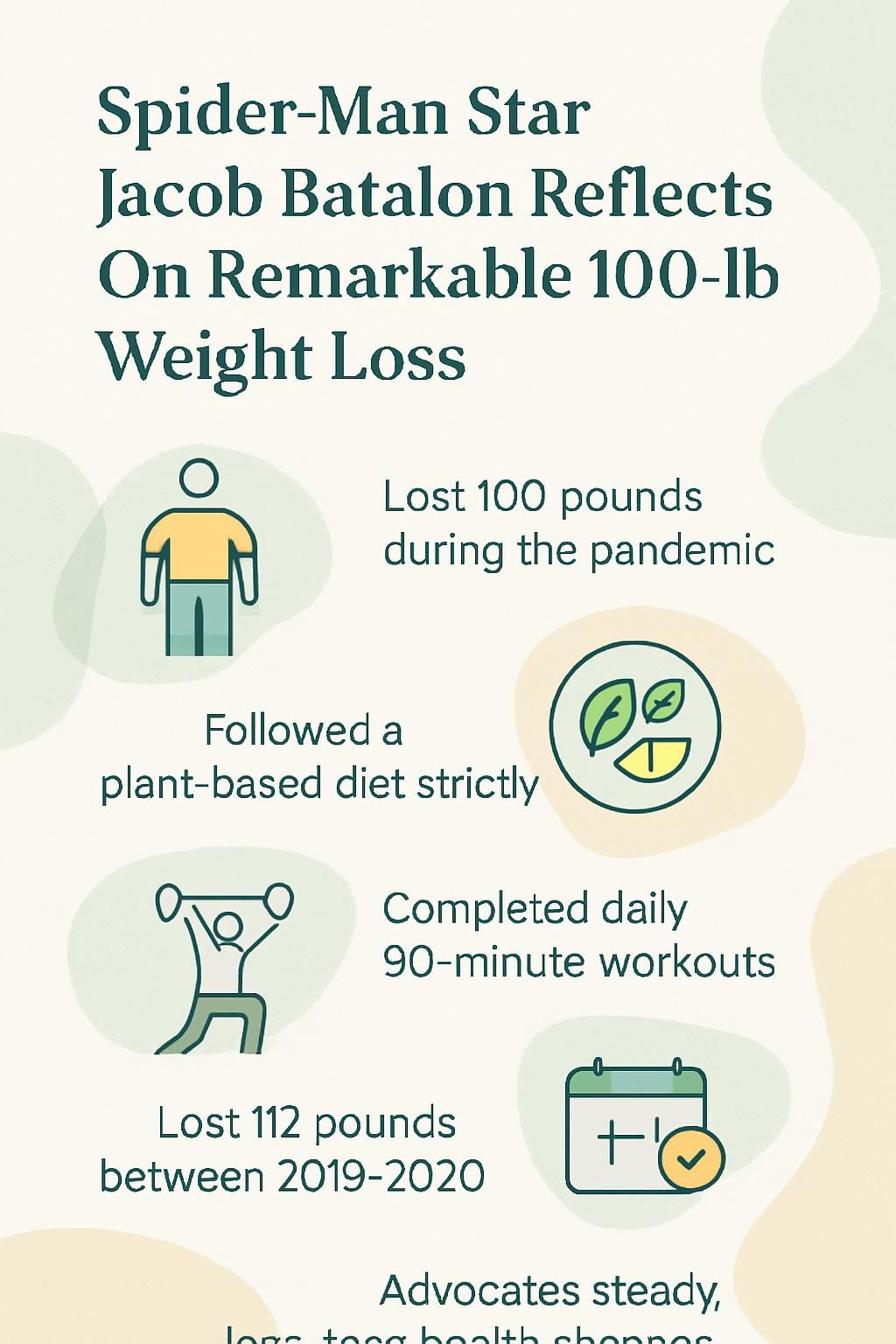Spider-Man Star Jacob Batalon Reflects On Remarkable 100-lb Weight Loss
Our Nutrition Assistant AI Suite will transform your body. You will lose fat, get toned, and build muscle. Gain confidence and optimal health.
If you want better health and steadier energy, Spider-Man star Jacob Batalon shows a clear path. His 100-pound weight loss started during the pandemic, built on simple daily habits. You can use the same approach to begin your own plan and keep it going.
This guide walks through what sparked his change, the actions he took, and how those steps improved his life. You will also see practical ideas you can try right away.
Key Takeaways
- Jacob Batalon, who plays Ned Leeds in Spider-Man, lost about 100 pounds during the pandemic through consistent diet and training changes.
- His core plan: a plant-based diet, 90-minute sessions six days a week with a trainer on FaceTime, and steady portion control.
- The wake-up call came after getting winded on stairs and seeing his body in the mirror, leading to a 112-pound loss from late 2019 to 2020.
- He reports better energy, stronger confidence, and new career momentum, with coverage in Men’s Health and support across social media.
- He promotes long-term habits, professional guidance, and a supportive circle as keys to lasting results.

Who Is Jacob Batalon?

Jacob Batalon is best known in the Marvel Cinematic Universe as Peter Parker’s best friend. His story is also a real-world example of health change and discipline.
What Are Jacob Batalon’s Career Highlights?
Batalon broke out in 2017 as Ned Leeds in Spider-Man: Homecoming. He returned in Spider-Man: Far From Home and Spider-Man: No Way Home, adding humor and heart to the films. The friendship between Ned and Peter became a highlight for many fans.
He expanded beyond Marvel with Reginald the Vampire on SYFY, serving as both lead actor and executive producer. Season two premiered on May 8, 2024. He also appeared in the horror film Tarot and joined the cast of Novocaine with Jack Quaid. Family support helped him take the first step toward acting, and steady work built his career.
“I never thought I’d get to this point. But my family always believed in me,” Jacob Batalon shared during an interview about his career progress.
What Role Does He Play in the Spider-Man Films?
Batalon plays Ned Leeds, Peter Parker’s loyal best friend. In Spider-Man: Homecoming, Ned discovers Peter’s secret and becomes a key ally. Their on-screen chemistry with Tom Holland adds warmth and laughs, which helped shape the tone of the series.
Ned often steps into the action, not just comic relief. As Batalon grew as a person, Ned grew as a character. In Spider-Man: No Way Home, he appears after losing 100 lbs, which mirrored his real-life change.
The Motivation Behind His Weight Loss
Jacob Batalon reflects on 100-pound weight loss with a simple idea in mind: health is wealth. A small moment can start a big shift.
Why Did Jacob Batalon Want to Improve His Health?
Getting winded on stairs made him stop and think. Seeing his reflection, especially without a shirt, pushed him to take action. Long days on set and constant snacking left him tired and unhappy.
At the end of 2019, he focused on a plan. He wanted more energy, better mental health, and a happier life. That choice led to a 112-pound loss over the next year.
I saw myself without a shirt and didn’t recognize the person looking back at me, he admitted in an interview with Men’s Health.
Moments like that can be powerful. They help you choose your well-being and take the first step.
How Did Weight Loss Affect His Confidence and Well-Being?
Progress built confidence. In an Instagram mirror photo, he shared pride in his results and set clear boundaries around unsolicited advice. That confidence carried into daily life.
He trained six days a week with his personal trainer on FaceTime. Each session felt essential. By season two of Reginald the Vampire, he moved with more comfort and ease. Mental health often improves when your body feels strong and capable.
Jacob Batalon’s Weight Loss Journey
Star Jacob Batalon reflects on his plan that helped him lose 112 pounds. One decision turned into steady habits, then real change.
What Challenges Did He Face at the Start?
Early on, he struggled with commitment and structure. Set snacks and sugary drinks were hard to avoid. Fatigue made it tough to stay consistent.
Switching from a meat-heavy menu to a plant-based diet took effort. Long filming days tested his discipline. Like many people, he had to replace old habits with better ones, one choice at a time.
What Lifestyle Changes Did He Make?
He built a routine that was simple and repeatable. You can use the same pieces.
- Train six days a week for about 90 minutes with guidance from a personal trainer.
- Adopt a plant-based diet, focusing on protein-rich plants and vegetables. His girlfriend helped him make the switch.
- Cut out sugary drinks and ultra-processed snacks to reduce calories and cravings.
- Use portion control at every meal to manage intake without feeling deprived.
- Alternate strength days and aerobic exercise days to build muscle and support your heart.
- Take one rest day each week for recovery so your body can repair and grow.
- Work with a qualified trainer if possible for a plan, support, and progress checks.
Key Elements of His Transformation
In an interview with Men’s Health, he shared the core pillars that kept him on track. The strategy is clear and practical.
How Did a Plant-Based Diet Help Jacob Batalon?
A plant-based diet centers on whole foods like beans, lentils, grains, fruits, and vegetables. This approach offers fiber, which helps you feel full and reduces snacking. Guided by his girlfriend, he moved away from heavy meats toward plants and simple meals.
Plant-forward eating supported steady weight loss and stable energy. Many studies link this style of eating with a lower risk of heart disease and better weight control. He also focused on portions and structure, not quick fixes or drugs like Ozempic or Semaglutide. Those medicines can help some people under medical care, but lifestyle changes still matter.
What Was His Regular Exercise Routine Like?
Consistency was the key. He trained six days a week, often on FaceTime with his coach. Each session lasted about 90 minutes.
The split was simple: roughly one hour of strength work and thirty minutes of cardio. Muscle groups rotated through the week. That plan built strength, protected joints, and supported recovery.
How Did Working with a Personal Trainer Influence His Journey?
A skilled trainer adds structure and accountability. Batalon often trained with his coach remotely. The coach guided his lifts, adjusted intensity, and kept sessions balanced.
That support helped him push through tough days and avoid injury. Clear feedback on form and nutrition choices kept progress steady. With expert help, he stayed focused and confident.
Exercises in His Fitness Regimen
His training mixed cardio for endurance with strength work for muscle and joint support. Variety kept the plan engaging.
What Cardio Workouts Did He Do?
Each workout included about 30 minutes of cardio. The goal was to burn calories and build stamina. He used steady treadmill work and simple intervals to stay challenged.
Cardio alternated in style across the week to prevent boredom and plateaus. Six cardio blocks per week added up to meaningful change.
What Strength Training Exercises Did He Follow?
Strength work filled the first hour. Classic lifts gave the most return: squats, bench presses, rows, deadlifts, and curls. Rotating muscle groups reduced strain and improved recovery.
The plan updated often to keep gains coming. Building muscle raises metabolism, which helps with weight control over time.
How Did Functional Movements Fit Into His Routine?
Functional movements train patterns you use in daily life. Squats, lunges, and hinge lifts build strength across several muscles at once. Good form improves posture and balance.
This type of training helps you move with purpose and reduces injury risk. It also makes everyday tasks feel easier.
The Impact of Weight Loss on His Life
Healthy habits did more than change the scale. They reshaped how he felt day to day.
How Did Weight Loss Improve His Physical Health?
Greater stamina made long days manageable. Stronger muscles and regular cardio supported heart health and daily comfort. Work on set felt less tiring and more focused.
Cutting processed foods and sugary drinks improved his energy swings. A steady routine supported a fitter body and better performance.
What Mental and Emotional Benefits Did He Experience?
Confidence grew alongside physical changes. He spoke openly about feeling more self-assured and set boundaries about advice on his body. That mindset shift reduced stress.
Clearer focus and a stronger mood are common when sleep, food, and exercise align. Progress builds pride, which helps you keep going.
How Did Weight Loss Affect His Professional Opportunities?
Improved fitness supported long shoot days and leading roles. In season two of Reginald the Vampire, he moved with more ease and energy. That freedom shows on camera.
His story also raised his profile in media. Industry leaders noticed his discipline and growth, which can lead to new roles and projects.
Lessons from Jacob Batalon’s Journey
Small daily actions beat big promises. His experience shows how steady efforts add up.
Why Are Commitment and Consistency Important?
Commitment keeps you going when progress feels slow. Consistency builds habits that carry you through busy weeks. Batalon trained six days a week for months, and that rhythm produced results.
Regular check-ins with a coach can keep you accountable. Over time, small wins stack up into major change, like his 100-pound loss.
How Should We View Health as a Long-Term Investment?
Think long game. Strong habits protect your future health and your daily energy. Big swings are less helpful than steady steps that fit your life.
- Losing 5 to 10 percent of body weight can cut diabetes risk in people with prediabetes by about 58 percent, based on the Diabetes Prevention Program.
- Adults benefit from at least 150 minutes of moderate aerobic exercise per week, says the CDC.
- Plant-forward eating patterns are linked to lower heart disease risk in large studies from groups like the American Heart Association.
Set one simple goal each week, such as three walks or cooking two plant-based dinners. Clear targets make progress easier to track and repeat.
Inspiring Others Through His Story
Stories like this spark action. Many fans used his example to start their own plans.
How Have Fans and the Public Reacted?
Support poured in after his 2020 full-length mirror selfie on Instagram. People praised his 100-lb change and his honest updates.
Major outlets covered his journey, which encouraged discussions about health and body image. His message about boundaries and confidence resonated with many readers who faced similar struggles.
How Does He Advocate for Health and Fitness?
Batalon talks about commitment, consistency, and simple routines across interviews and posts. He explains how a plant-based diet and steady workouts boosted his energy and mood.
He also highlights the value of a trainer for safe progress. Sharing his experience makes the path feel practical and reachable for others.
Conclusion
Jacob Batalon’s 100-pound weight loss shows what steady habits can do. With a plant-based diet, routine exercise, and strong support, you can move closer to your goals too. The Spider-Man actor proves that health is wealth, and consistent effort opens new doors in life and work.
This article is for education, not medical advice. Talk with a healthcare professional before changing your diet, exercise, or medicines, including drugs like Ozempic or Semaglutide.
Sources: CDC Physical Activity Guidelines; Knowler WC et al., Diabetes Prevention Program (NEJM 2002); American Heart Association statements on plant-based patterns.
FAQs
1. How did Jacob Batalon achieve his 100-pound weight loss?
Jacob Batalon, known for his role in the Spider-Man films, achieved a 100-pound weight loss through consistent exercise and dietary changes. He followed a structured fitness routine and focused on balanced nutrition. Interviews with reputable entertainment outlets confirm that he worked with trainers and nutritionists to guide his progress.
2. What diet changes did Jacob Batalon make during his transformation?
Batalon reduced processed foods and increased his intake of vegetables, lean proteins, and whole grains. He monitored portion sizes and avoided sugary drinks. According to health experts cited in Men’s Health and similar publications, these changes support sustainable weight management.
3. What impact did this weight loss have on Jacob Batalon’s health and career?
Losing 100 pounds improved Batalon’s energy levels and overall well-being. He reported feeling more confident on set and able to perform physically demanding scenes with greater ease. Medical studies show that significant weight reduction can lower risks of chronic diseases such as diabetes and heart disease.
4. What advice does Jacob Batalon offer others seeking similar results?
Batalon encourages setting realistic goals and seeking professional guidance from trainers or nutritionists. He emphasizes patience and persistence over quick fixes. His experience highlights the importance of long-term lifestyle changes rather than temporary diets.
Summary:
Jacob Batalon’s journey involved structured exercise, dietary improvements, and professional support. His experience demonstrates that gradual changes lead to lasting results, improved health, and increased confidence. Data from health experts supports these strategies as effective for sustainable weight management.







